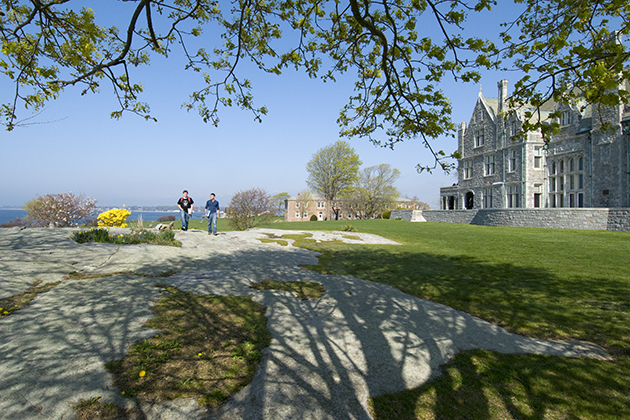
A group of prominent new faculty members with expertise in coastal and marine issues will join UConn’s College of Liberal Arts and Sciences at the Avery Point campus over the next two years. The new professors will be part of the departments of marine sciences, economics, and mathematics, and will expand UConn’s strengths in cross-disciplinary studies of coastal ecosystems.
The new additions to Avery Point were made possible by a multi-year hiring initiative launched in 2012 to expand UConn’s faculty in strategic research and teaching areas.
“The stellar new hires in marine sciences and marine studies at Avery Point are a prime example of interdisciplinary research and teaching in CLAS,” says Jeremy Teitelbaum, dean of the College of Liberal Arts and Sciences. “These new faculty expand our already thriving programs that focus on Connecticut’s coastal ecosystems.”
Marine Sciences expands
Ann Bucklin, professor and head of the marine sciences department, proposed a multi-stage cluster hire initiative to recruit researchers who study the effects of climate and weather on the coastal ocean.
“The goal is not to compete with large institutions doing general oceanic research, but instead position ourselves within a small, elite class of institutions with marine programs that can conduct research that is pertinent to the needs of our state and coastal regions,” says Bucklin.
Bucklin’s initiative – labeled Climate and Human Alteration of Coastal Ecosystems (CHACE) – recruited four new faculty members to the Department of Marine Sciences. The new faculty all focus on how human actions alter coastal ecosystems in Connecticut and beyond.

David Lund joins the Department of Marine Sciences this fall as an associate professor. Coming from the University of Michigan, his research focuses on the ocean’s role in climate change on centennial to millennial timescales.
Lund says he was attracted to UConn’s marine sciences program because of its faculty’s “broad range of expertise.”
“The state-of-the-art Marine Sciences Building and the recent hiring of several new faculty demonstrate that the University has a strong commitment to oceanographic research,” he says.
Kelly Lombardo joins the department this fall as an assistant professor. She was previously a postdoctoral research associate in the School of Marine and Atmospheric Sciences at Stony Brook University. Her primary research interests include modeling and observational analysis of coastal storm processes and regional climate change of coastal weather phenomena.

Lombardo recognizes that she will be in a unique position “to actively contribute to the development and expansion of the atmospheric science component of the marine sciences department.” She looks forward to collaborating with renowned scientists, establishing a weather lab to enhance interest in meteorology, and developing rigorous academic courses on atmospheric science fundamentals.
Two other professors will join the department in fall 2014 from Stony Brook University. Assistant professor Hannes Baumann is interested in how organisms adapt to the consequences of climate change and eutrophication of coastal waters. And assistant research professor Zofia Baumann studies the environmental and public health consequences of contamination in marine systems, including sources of contaminants and their pathways within marine food webs.
Bucklin says the new CHACE faculty form a critical mass that will allow the department to take the lead on multi-institution proposals for national investments from agencies such as the National Science Foundation.
“We have frequently collaborated on multi-institutional initiatives, but our department has not been large enough to lead these proposals,” says Bucklin. “Our goal is to continue to grow our department.”
An integrated campus
Two additional faculty members, one each in economics and mathematics, were also hired this year. The professors were recruited through a hiring plan developed by the director of the Avery Point campus, Michael Alfultis, and will arrive on campus this fall.
Alfultis’s proposal complements the CHACE initiative by seeking new faculty in the social sciences and humanities whose research interests pertain to marine and maritime studies.
“We are one of the few schools with a location right on the water that specializes in science, humanities, and social science studies of the ocean,” Alfultis explains. “It’s important to build on this by adding faculty in areas that complement the expertise and research interests of the marine sciences faculty, thus increasing opportunities for interdisciplinary collaborations centered on the coastal environment.”
We are one of the few schools with a location right on the water that specializes in science, humanities, and social science studies of the ocean.
Michele Baggio joins the Department of Economics as an assistant professor. Previously a researcher and lecturer at the Swiss Institute of Technology (ETH) in Zürich, Switzerland, his background is in the fields of environmental and resource economics, ecological economics, and applied microeconomics, with a specific focus on aquatic ecosystems. He has previously studied the American lobster population of the Long Island Sound.
Jeffery Connors joins the Department of Mathematics as an assistant professor, coming to UConn from Lawrence Livermore National Laboratory in Livermore, Calif. He is interested in numerical methods with applications to problems in fluid dynamics and climate science.
Alfultis says he’s confident that the new faculty at Avery Point will contribute to what he calls “cross-disciplinary solutions for sustainable coastal environments and economics.”
“Oceanography is an interdisciplinary science that requires input from all of the traditional disciplines to address issues of pressing concern to society, including coastal pollution, sea-level rise, and global climate change,” agrees Lund. “I’m looking forward to working with the various faculty at Avery Point.”


